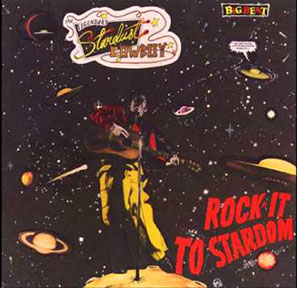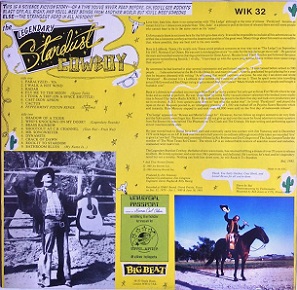The Atrocious Music Collection: #6 in a series
Artist: Legendary Stardust Cowboy (b. 1947)
Album Title: Rock-It to Stardom
Category: Outsider MusicYear: 1984
Cover art style: Space Cowboy
Audio samples: Acquisition: Recorded from WFMU
I actually do not have this album. I’ve never even seen it. What I have is a cassette tape of five songs, four of which are from this album, which were likely recorded from Irwin Chusid’s WFMU (East Orange, NJ) show, the Atrocious Music Hour. And so, this is as good as place as any to pause and give credit where credit is due. There would likely be no Heuser Atrocious Music Collection without the push from Irwin.
Irwin’s Atrocious Music Hour ran weekly in the early 1980s, and later Irwin moved on to other shows and discoveries, always in related areas like Incorrect Music (his term). His expertise is such that he was asked to author the liner notes for the Golden Throats albums, and penned the book Songs in the Key of Z: The Curious World of Outsider Music, which I recommend. (I actually did not read Songs in the Key of Z until after creating this web home for my Collection, and so complementary aspects of the two are happy accidents.)
Irwin’s show, along with the rest of WFMU’s free form radio, was a find of my brother’s. I take no credit, and without either one, there would be no collection. Of course, one could argue that without Dr. Demento, there would be no Collection AND no Atrocious Music Hour. And without Spike Jones, no Dr. Demento. And so it goes...
I digress, obviously, but for good reason. Norman Carl Odam apparently christened himself the Legendary Stardust Cowboy at a fairly young age. It was as the Lege, then, that in 1968 he recorded his first song, Paralyzed, the one which would truly make him a Legend, perhaps out of the sheer boredom that can come to someone growing up in Lubbock, Texas. Like many outsider artists, the idea of influences – so central to the artistic continuum – breaks down here. The LSC seems to have no predecessors, be part of no tradition, and Paralyzed, in particular, seems to stand by itself.
I don’t know if there’s any way now to listen to the LSC’s original Paralyzed from 1968. It seems to be lost to time except for some lucky few who ended up with the record. It appears the version I have, which is from the album Rock-It to Stardom, was a re-recording of the original done circa 1979; the album eventually came out in 1984.
Regardless, when we hear Paralyzed we are likely to think either, “What a way to make a song!!” (Or “What a way to make a song?!?”) It is revolutionary and inconceivable and ignores all songwriting traditions. It is like a dart thrown in a room without a dartboard, sticking somewhere in a wall or ceiling or floor, where the idea of being "off-target" loses all meaning, such that we start to consider awarding it points again. But instead of 5 or 10 points, we award it “N” points. Or “Aardvark.”
Paralyzed may not be good or even meet any minimum professional standard, but it is certainly different. Vitality and energy crackle around it. It mixes the “I can’t understand the words,” of the Kingsmen’s famous version of Louie, Louie with the “Oh... that’s the song?” feeling you get when your very young child has announced they are going to present you with their (spontaneous) musical creation, which, in reality, is a going-to-bed-delaying-tactic disguised as art.
It also reminds me of David Byrne’s story about the creation of Psycho Killer, which he wrote, he said, to see if he could write a song. The singer seems as surprised as us about what happens next. Paralyzed has a refrain (“Paralyzed!”) and things in between the refrains – shouting and mumbling with occasional words (“Cadillac!”). There’s a chord. There’s a beat. There’s even both a drum solo and a trumpet solo. So, it seems to have the parts needed to be a song, and maybe we just have to stop being so picky about how those parts work.
The other songs "written" by the LSC on the tape, Radar, Who’s Knocking at my Door, and Relaxation (this last one from the 1986 Retro Rocket Back to Earth album), are less chaotic, but partake of the a similar mindset. I’m partial to Radar. In Radar, no matter what the singer does, his "baby tracks him down like radar," which, conventionally, would play into male fears of the transformation of a fun-loving woman into the overbearing wife. Not so here. For the LSC, this is a good thing, to be tracked down like radar, even when he’s on his own patio roasting wieners. I’m telling you she can’t be beat/I’m sayin’ to you she’s really a treat.
Like most of his songs, Radar connects with themes of outer space and technology. It’s no wonder, therefore, that he selects Fly Me to the Moon as a cover song. As LSC did not write it, we are allowed to focus our attention and appreciation solely on the delivery. How does LSC handle singing? Listen and enjoy. I really like the way the beat falls apart at a couple of different points. Not content to restrain his creativity, LSC adds a spoken bit which revolves around the E=MC2 equation, so there is that.
Like many artists in the collection, LSC lived in an odd musical/celebrity world. Paralyzed was revered by the Dr. Demento crowd, and got him on Laugh-In. He found a way to cut some albums over the years. He is the subject of a documentary. He still performs. And so on.
But one little item stands out. David Bowie, on what I think is one his under-rated albums, 2002’s Heathen, actually covers a LSC song, I Took a Trip on a Gemini Spaceship, originally penned the same year as Paralyzed. Bowie has come up here before (see Klaus Nomi), and as the man who always tried to be the Outsider himself, perhaps we should not be surprised.
As might be expected, Bowie’s version (here) bears little resemblance to LSC’s (here). But through Bowie, LSC’s music connects up with the wider musical world after all, entering the tradition through a side-door.
Bowie was asked where he had discovered the Legendary Stardust Cowboy, to which he replied: "When I first joined Mercury Records in the late 60s, he was one of the only other artists they had. And they gave me his entire catalogue, which at the time was three singles. I immediately fell in love with his music. Well actually, the IDEA of his music. As the music itself wasn't too recognizable as being such."
I cannot think of a better way to put it.


